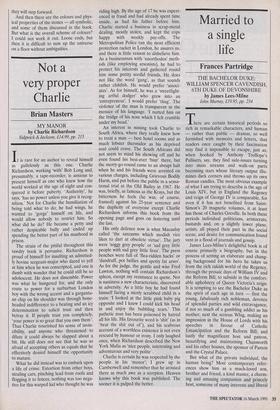Not a very proper Charlie
Brian Masters
MY MANOR by Charlie Richardson Sidgwick &Jackson, £14.99, pp. 215 It is rare for an author to reveal himself as guilelessly as this one. Charlie Richardson, working 'with' Bob Long and, presumably, a tape-recorder, is anxious to present himself as one who knew how the world worked at the age of eight and con- quered it before puberty. 'Authority', he says, 'has no power unless you give it recog- nition.' Not for Charlie the humiliation of being told what to do; he had wings, he wanted to 'gorge' himself on life, and would allow nobody to restrict him. So what did he do? He became a petty and rather despicable bully and ended up spending the better part of his manhood in prison.
The strain of the pitiful throughout this tawdry book is pervasive. Richardson is proud of himself for insulting an admitted- ly bovine sergeant-major who dared to yell at him when he was conscripted, and one is dumb with wonder that he could still be so adolescent. He does not dissemble. Power was what he hungered for, and the only route to power for a surburban London boy with the wrong accent and a gargantu- an chip on his shoulder was through bone- headed indifference to a beating and an icy determination to solicit trust and then betray it. If people trust you completely, 'your power is so great that you own them '. Thus Charlie nourished his sense of invin- cibility, and anyone who threatened to dilute it could always be slapped about a bit. He still does not see that he was so afraid of accepting others as equals that he effectively denied himself the opportunity to mature.
What he did instead was to embark upon a life of crime. Extortion from other boys, stealing cars, pinching lead from roofs and flogging it to fences, nothing was too nega- tive for this warped kid who thought he was riding high. By the age of 17 he was experi- enced in fraud and had already spent time inside, as had his father before him. Charlie started a business in scrap-metal dealing, mostly stolen, and kept the cops happy with weekly pay-offs. The Metropolitan Police ran the most efficient protection racket in London, he assures us, and there is little reason to disbelieve him. As a businessman with 'unorthodox' meth- ods (like employing arsonists), he had to protect his interests and gathered round him some pretty sordid friends. He does not like the word 'gang', as that sounds rather childish. He would prefer 'associ- ates'. As for himself, he was a `streetfight- ing artful dodger' who grew into an 'entrepreneur'. I would prefer 'thug'. The violence of the man is transparent in the menace of his language. 'I nutted him on the bridge of his nose which I felt crumble under my head.'
An interest in mining took Charlie to South Africa, where they really knew how to treat a man — best hotel rooms and as much lobster thermidor as his deprived soul could crave. The South Africans did not seem to mind his showing off and he even found his best-ever 'bine there, but the merry-go-round came to an abrupt halt when he and his friends were arrested on various charges, including Grievous Bodily Harm, and put before the public in a sensa- tional trial at the Old Bailey in 1967. He was, briefly, as famous as the ICrays, but the bitterness he feels (he was, of course, framed) against his 25-year sentence and the duplicity of everyone except Charlie Richardson informs this book from the opening page and goes on festering until the last.
His only defence now is what Macaulay called 'the sarcasms which modish vice likes to dart at obsolete virtue'. The jury were 'soggy grey people' or 'sad grey little people with sad grey little lives'. The press benches were full of 'flea-ridden hacks' or 'dandruff, pot bellies and spotty fat arses'. As for the judge, the gentle and wise Fred Lawton, nothing will contain Richardson's spleen, except my resistance to quote. Nor is nastiness a new characteristic, discovered in adversity. As a little boy he had found himself facing a nicely scrubbed child in a train: 'I looked at the little pink baby pig opposite and I knew I could kick his head in and enjoy the bubbling tears.' This pathetic man has been poisoned by hatred all his life. His favourite word is 'shit' (as in beat the shit out of'), and his scabrous account of a worthless existence is not even rescued by humour or irony. I only jaughed once, when Richardson described the New York Mafia as 'nice people, interesting and adventurous and very polite
Charlie is certain he was respected by the people in his 'manor'; I grew up in Camberwell and remember that he aroused there as much awe as a scorpion. Heaven knows why this book was published. The sooner it is pulped the better.


























































 Previous page
Previous page